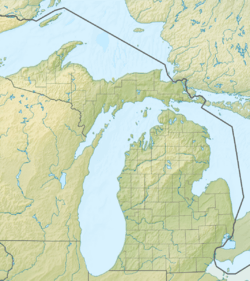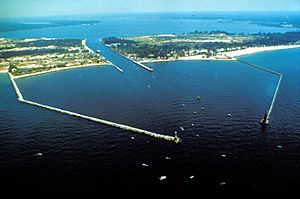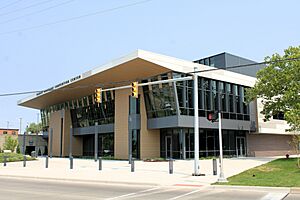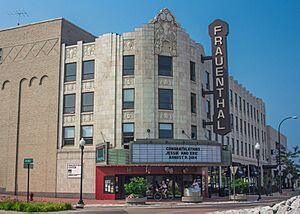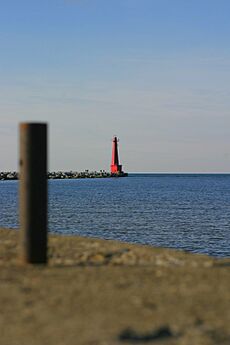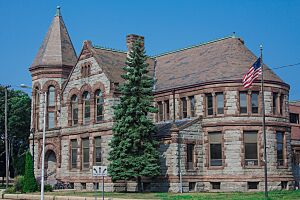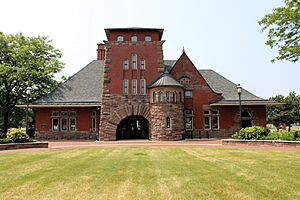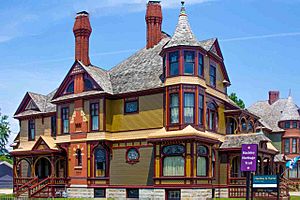Muskegon, Michigan facts for kids
Quick facts for kids
Muskegon, Michigan
|
|
|---|---|
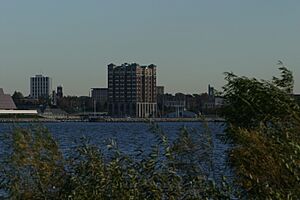
Muskegon viewed from across Muskegon Lake
|
|
| Nickname(s):
Port City, Lumber Queen of the World, Skeetown, Midwest Riviera, Lumbertown
|
|
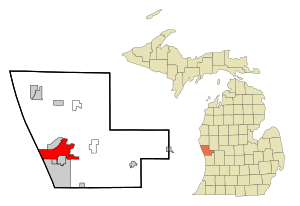
Location within Muskegon County and the state of Michigan
|
|
| Country | United States |
| State | Michigan |
| County | Muskegon |
| Government | |
| • Type | Commission-Manager |
| Area | |
| • City | 18.20 sq mi (47.13 km2) |
| • Land | 14.14 sq mi (36.63 km2) |
| • Water | 4.05 sq mi (10.50 km2) |
| Elevation | 617 ft (191.4 m) |
| Population
(2020)
|
|
| • City | 38,318 |
| • Density | 2,709.33/sq mi (1,046.05/km2) |
| • Metro | 175,824 |
| Time zone | UTC−5 (EST) |
| • Summer (DST) | UTC−4 (EDT) |
| ZIP codes |
49440-49445
|
| Area code(s) | 231 |
| FIPS code | 26-56320 |
| GNIS feature ID | 1620963 |
Muskegon is a city in Michigan, United States. It is the main city of Muskegon County. The city is located on a harbor of Lake Michigan. Muskegon is famous for fishing, sailing races, and boating. It is the largest city on the eastern side of Lake Michigan. In 2020, about 38,318 people lived there. Muskegon is also the center of a larger area with about 175,824 people.
Contents
History of Muskegon
The name "Muskegon" comes from an Ottawa word, mashkiigong. This word means "marshy river" or "swamp."
French maps from the late 1600s showed the "Masquigon" River. This means French explorers reached Michigan's western coast by then. Father Jacques Marquette traveled through this area in 1675. French soldiers also passed through in 1679.
The first known European-American person to live here was Edward Fitzgerald. He was a fur trader who arrived in 1748. Between 1790 and 1820, several French-Canadian fur traders set up posts around Muskegon Lake.
More European-Americans started settling in Muskegon in 1837. This was when the area's huge timber resources began to be used. The lumber industry grew very fast. Many settlers came, especially from Germany, Netherlands, and Sweden.
Some parts of Muskegon started as separate villages. Bluffton was a lumbering village founded in 1862. Muskegon became part of it in 1889.
Muskegon's Geography
Muskegon is in western Muskegon County. It sits on the south side of Muskegon Lake, which is a harbor of Lake Michigan. To the north, across Muskegon Lake, are North Muskegon and Laketon Township. Other nearby towns include Muskegon Heights and Norton Shores.
The city covers about 18.20 square miles (47.13 square kilometers). About 4.05 square miles (10.50 square kilometers) of this is water. The Muskegon River flows into Muskegon Lake.
In 2022, local groups finished cleaning up Muskegon Lake. This means the lake is no longer on the EPA's list of "Areas of Concern." This cleanup is expected to bring new economic activity to the downtown area.
Muskegon's Climate
Muskegon has a humid continental climate. This means it has hot summers and cold winters. It rains or snows steadily all year. Muskegon gets a lot of lake-effect snow in winter from Lake Michigan.
| Climate data for Muskegon, Michigan (Muskegon County Airport) 1991–2020 normals, extremes 1896–present | |||||||||||||
|---|---|---|---|---|---|---|---|---|---|---|---|---|---|
| Month | Jan | Feb | Mar | Apr | May | Jun | Jul | Aug | Sep | Oct | Nov | Dec | Year |
| Record high °F (°C) | 63 (17) |
67 (19) |
82 (28) |
86 (30) |
96 (36) |
98 (37) |
99 (37) |
99 (37) |
95 (35) |
86 (30) |
76 (24) |
66 (19) |
99 (37) |
| Mean maximum °F (°C) | 50.3 (10.2) |
51.1 (10.6) |
65.6 (18.7) |
76.0 (24.4) |
83.6 (28.7) |
89.1 (31.7) |
89.8 (32.1) |
88.4 (31.3) |
85.8 (29.9) |
76.4 (24.7) |
63.4 (17.4) |
53.3 (11.8) |
91.6 (33.1) |
| Mean daily maximum °F (°C) | 32.5 (0.3) |
34.5 (1.4) |
44.3 (6.8) |
56.6 (13.7) |
68.4 (20.2) |
77.7 (25.4) |
81.6 (27.6) |
80.2 (26.8) |
73.4 (23.0) |
60.6 (15.9) |
47.8 (8.8) |
37.4 (3.0) |
57.9 (14.4) |
| Daily mean °F (°C) | 26.6 (−3.0) |
27.7 (−2.4) |
35.7 (2.1) |
46.8 (8.2) |
57.9 (14.4) |
67.4 (19.7) |
71.9 (22.2) |
70.8 (21.6) |
63.5 (17.5) |
51.9 (11.1) |
41.0 (5.0) |
31.9 (−0.1) |
49.4 (9.7) |
| Mean daily minimum °F (°C) | 20.7 (−6.3) |
20.8 (−6.2) |
27.1 (−2.7) |
36.9 (2.7) |
47.5 (8.6) |
57.2 (14.0) |
62.2 (16.8) |
61.3 (16.3) |
53.5 (11.9) |
43.2 (6.2) |
34.1 (1.2) |
26.3 (−3.2) |
40.9 (4.9) |
| Mean minimum °F (°C) | 0.7 (−17.4) |
2.4 (−16.4) |
8.3 (−13.2) |
21.8 (−5.7) |
32.2 (0.1) |
42.5 (5.8) |
49.3 (9.6) |
48.6 (9.2) |
38.3 (3.5) |
28.3 (−2.1) |
20.7 (−6.3) |
10.0 (−12.2) |
−2.7 (−19.3) |
| Record low °F (°C) | −21 (−29) |
−30 (−34) |
−11 (−24) |
1 (−17) |
22 (−6) |
31 (−1) |
39 (4) |
36 (2) |
27 (−3) |
19 (−7) |
−14 (−26) |
−15 (−26) |
−30 (−34) |
| Average precipitation inches (mm) | 2.42 (61) |
2.11 (54) |
2.40 (61) |
3.47 (88) |
3.38 (86) |
3.05 (77) |
2.75 (70) |
3.10 (79) |
3.26 (83) |
3.80 (97) |
2.92 (74) |
2.42 (61) |
35.08 (891) |
| Average snowfall inches (cm) | 29.1 (74) |
20.0 (51) |
7.5 (19) |
1.8 (4.6) |
0.0 (0.0) |
0.0 (0.0) |
0.0 (0.0) |
0.0 (0.0) |
0.0 (0.0) |
0.0 (0.0) |
6.5 (17) |
22.3 (57) |
87.2 (221) |
| Average precipitation days (≥ 0.01 in) | 16.3 | 12.9 | 10.9 | 12.5 | 11.3 | 10.0 | 9.1 | 9.1 | 9.4 | 12.6 | 13.5 | 14.9 | 142.5 |
| Average snowy days (≥ 0.1 in) | 14.4 | 11.7 | 5.4 | 1.4 | 0.0 | 0.0 | 0.0 | 0.0 | 0.0 | 0.2 | 4.1 | 10.9 | 48.1 |
| Average relative humidity (%) | 78.1 | 75.2 | 71.1 | 65.4 | 64.1 | 68.2 | 70.6 | 74.5 | 76.4 | 74.3 | 74.9 | 78.6 | 72.6 |
| Average dew point °F (°C) | 17.1 (−8.3) |
17.4 (−8.1) |
24.4 (−4.2) |
33.1 (0.6) |
43.0 (6.1) |
53.6 (12.0) |
59.5 (15.3) |
59.7 (15.4) |
53.2 (11.8) |
42.3 (5.7) |
31.8 (−0.1) |
22.3 (−5.4) |
38.1 (3.4) |
| Source 1: NOAA (relative humidity and dew point 1961–1990) | |||||||||||||
| Source 2: World Meteorological Organization | |||||||||||||
Muskegon's Population
| Historical population | |||
|---|---|---|---|
| Census | Pop. | %± | |
| 1860 | 1,450 | — | |
| 1870 | 6,002 | 313.9% | |
| 1880 | 11,262 | 87.6% | |
| 1890 | 22,702 | 101.6% | |
| 1900 | 20,818 | −8.3% | |
| 1910 | 24,062 | 15.6% | |
| 1920 | 36,570 | 52.0% | |
| 1930 | 41,390 | 13.2% | |
| 1940 | 47,697 | 15.2% | |
| 1950 | 48,429 | 1.5% | |
| 1960 | 46,485 | −4.0% | |
| 1970 | 44,631 | −4.0% | |
| 1980 | 40,823 | −8.5% | |
| 1990 | 40,283 | −1.3% | |
| 2000 | 40,105 | −0.4% | |
| 2010 | 38,401 | −4.2% | |
| 2020 | 38,318 | −0.2% | |
| U.S. Decennial Census | |||
In 2010, Muskegon had 38,401 people living in 13,967 homes. About 23.3% of the people were under 18 years old. The average age in the city was 34.1 years.
Muskegon's Economy
Downtown Muskegon is a busy center for the whole county. It has hotels, a large convention center, and the Trinity Health Arena. The Muskegon Farmer's Market is very popular, with over 10,000 visitors on summer Saturdays. There are also many small shops that help new businesses grow.
Arts and Culture in Muskegon
Muskegon is home to several historic ships. You can visit the USS Silversides Submarine Museum. It has a World War II submarine, a tank landing ship, and a Coast Guard cutter. The Milwaukee Clipper, a former passenger ship, is also docked here.
The Frauenthal Center for the Performing Arts has two theaters. It hosts plays, concerts, and is home to the West Michigan Symphony Orchestra. It was first built as the Michigan Theater in 1929.
The Muskegon Museum of Art opened in 1912. It has many important artworks, like Tornado Over Kansas. Muskegon also has many public art pieces displayed around the city, especially downtown.
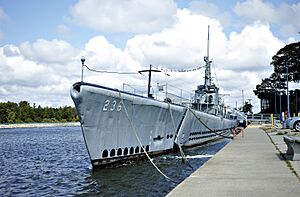
The Lakeshore Museum Center and Hackley & Hume Historic Site are open to visitors. These mansions belonged to rich lumber owners. They are part of downtown Muskegon's Heritage Village. The museum tells the story of Muskegon County. It covers everything from the Pottawatomi and Ottawa Native American tribes to the city's lumber history.
Muskegon's Festivals
Muskegon hosts many fun events and festivals:
- Taste of Muskegon in June, where you can try local foods.
- Parties in the Park, held every Friday from June to August at Hackley Park.
- The Lakeshore Art Festival in June, showing off local art.
- WeDiscover Festival in July, with electronic dance music, cars, food, and fireworks.
- A Motorcycle rally in July.
- Burning Foot Beer Festival at Pere Marquette Beach.
- The Unity Christian Music Festival in August at Heritage Landing.
- The Michigan Irish Music Festival in September at Heritage Landing.
- The Muskegon Polish Festival on Labor Day weekend.
- The International Buster Keaton Society annual convention in October.
Muskegon's Clubs and Groups
Many clubs and groups are active in Western Michigan, including:
- Independent Order of Vikings
- Fraternal Order of Eagles
- Knights of Columbus
- Polish Falcons
- Lithuanian Club
- Muskegon Recreational Club
- Lakeside Veterans Club
Sports in Muskegon
Muskegon is home to several sports teams:
| Club | Sport | League | Venue |
|---|---|---|---|
| Muskegon Lumberjacks | Ice hockey | United States Hockey League | Trinity Health Arena |
| West Michigan Ironmen | Indoor football | American Arena League | Trinity Health Arena |
| Muskegon Risers SC | Soccer | UPSL & Premier Arena Soccer League | Trinity Health Arena and Kehern Stadium |
Muskegon has also been home to many past sports teams:
| Club | Sport | Played from | League | Stadium |
|---|---|---|---|---|
| Muskegon Lumberjacks/Fury (1992–2010) | Hockey | 1992−2010 | IHL, UHL | Mercy Health Arena |
| Muskegon Thunder | Indoor football | 2007−2009 | IFL | Mercy Health Arena |
| Michigan Mayhem | Basketball | 2004−2006 | CBA | Mercy Health Arena |
| Muskegon Lumberjacks (1984–1992) | Hockey | 1984−1992 | IHL | Mercy Health Arena |
| Muskegon Mohawks | Hockey | 1965−1984 | IHL | Mercy Health Arena |
| Muskegon Zephyrs | Hockey | 1960−1965 | IHL | Mercy Health Arena |
| Muskegon Lassies | Baseball | 1946−1949 | AAGPBL | Marsh Field |
The Seaway Run is a race held every year in late June. It includes a 15k race, a 5k race, and a 5k walk.
Parks and Recreation in Muskegon
Pere Marquette Beach is the biggest free public beach on the eastern side of Lake Michigan. Many events happen here, like windsurfing and volleyball tournaments. The beach has soft sand and large sand dunes. It's a great place for biking, running, and hiking. You can also see amazing sunsets here.
The Muskegon Lakeshore Bike Trail lets you bike along Muskegon Lake to Lake Michigan. There are two bike paths. One is on the east side of Muskegon, and the other is on the north side. This northern path connects to other trails, like the Hart-Montague Bike Trail. This means you can bike all the way from Muskegon to Hart, Michigan, without leaving a bike trail.
Muskegon State Park has a Winter Sports Complex. Here you can go ice fishing, cross-country skiing, ice skating, and even try a luge track. P.J. Hoffmaster State Park has many sand dunes, two campgrounds, and a public beach.
Michigan's Adventure is the biggest amusement park in Michigan. It is located a few miles north of Muskegon. It has roller coasters, other rides, and a full water park.
The Muskegon Country Club was started in 1908. It has a golf course designed by famous golfers.
Education in Muskegon
Muskegon Public Schools started in 1860. They teach students from preschool through high school. They also run the Muskegon Training and Education Center. There are also private schools like Muskegon Catholic Central.
Muskegon has colleges too, like Muskegon Community College and Baker College. Other universities, such as Western Michigan University, offer programs on the Muskegon Community College campus.
Media in Muskegon
Muskegon's main newspaper is The Muskegon Chronicle. It is a daily newspaper that started in 1857.
The local television station is WMKG-CD.
Many radio stations serve the Muskegon area. Some popular ones include WUVS-LP 103.7 (hip-hop/R&B and gospel) and WUGM-LP 106.1 (Urban Oldies). Other stations play classical music, country, classic rock, and news.
Transportation in Muskegon
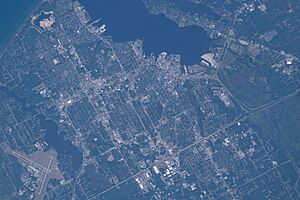
The Muskegon Area Transit System (MATS) provides public transportation. It has bus routes, trolley routes, and a special system for people with disabilities. The trolleys stop at popular places like the Hackley and Hume Historic Site and Muskegon State Park.
Commercial flights are available from Muskegon County Airport (MKG). You can fly nonstop to Chicago O'Hare Airport. Other airlines fly from the Gerald R. Ford International Airport (GRR) in Grand Rapids.
Muskegon is also where the Lake Express High-Speed Car Ferry leaves from. This ferry crosses Lake Michigan to Milwaukee, Wisconsin. It makes several trips a day in the summer.
Major Roads in Muskegon
Several important highways go through Muskegon:
|
Interstates |
U.S. Highways
|
Other State Highways
|
Rail Service in Muskegon
CSX Transportation and the Michigan Shore Railway provide train service for businesses in Muskegon. Passenger train services stopped in the 1960s. The closest places to catch a passenger train are in Holland or Grand Rapids.
Ferries in Muskegon
In 1937, the Grand Trunk Western company started running ferries. These ferries carried people and cars across Lake Michigan to Milwaukee. They stopped running in 1978. The Lake Express ferry started service in 2004, bringing ferry travel back to Muskegon.
Notable People from Muskegon
Muskegon has been home to many interesting people:
- John Beyrle, U.S. ambassador to Russia.
- Joseph Beyrle, a soldier who served in both the US Army and the Soviet Army in World War II.
- Nancy Anne Fleming, Miss America 1961.
- Vonda Kay Van Dyke, Miss America 1965.
- Captain Jonathan Walker, an abolitionist known as "The Man With the Branded Hand."
Business and Politics
- Margaret Bailey Chandler, a community leader and member of the Little River Band of Ottawa Indians.
- Tudor Dixon, a politician.
- Charles Hackley (1837–1905), a rich lumber baron and philanthropist. He gave a lot of money to the community for things like Hackley Hospital and Hackley Library.
- Richard Mell, a politician.
Religion
- Jim Bakker, a TV evangelist.
- Edmund Cardinal Szoka, a cardinal in the Catholic Church.
Science and Technology
- Heber Doust Curtis (1872-1942), an astronomer.
- Clara H. Hasse (1880–1926), a botanist.
- David Leestma, an astronaut.
- W. Wesley Peterson, a mathematician and computer scientist who invented the Cyclic Redundancy Check (CRC).
Artists
- Haddon Sundblom, a graphic artist who created popular images of Santa Claus for Coca-Cola.
Authors
- Laurie Keller, a children's book writer and illustrator.
- Douglas Malloch, known as the “lumberman’s poet.”
- John Frederick Nims, a poet.
- Lewis B. Smedes, a theologian and author.
- Bob Wood, an author.
Music
- Børns, a singer and songwriter.
- Steve Gorman, drummer for Black Crowes.
- Rick Johnson, bass player for Mustard Plug.
- Bettye LaVette, a soul singer.
- Iggy Pop, a famous punk rock musician.
- Louise Cooper Spindle, a composer.
- Wayne Static, lead singer and guitarist for Static-X.
- Bill Szymczyk, a music producer for bands like the Eagles.
- Gerry Teifer, a music publisher and songwriter.
- Richard Versalle, an opera singer.
Stage
- Carly Jibson, a Broadway and television actress.
- Buster Keaton, an iconic comedian and film director. He spent his childhood summers in Muskegon.
- Kate Reinders, a Broadway actress.
Television
- Matt Crouch, a film producer and CEO of TBN.
- Harry Morgan, an actor who played Colonel Potter on the TV show M*A*S*H.
- Frank Stanton, a former president of CBS.
- Quincy Isaiah, an actor who played Magic Johnson in the HBO series Winning Time: The Rise of the Lakers Dynasty.
Sports
- Justin Abdelkader, an NHL player.
- Curtis Adams, an NFL player.
- Beatrice Allard, All-American Girls Professional Baseball League player.
- Virginia Bell, an AAGPBL player.
- Donna Cook, an AAGPBL player.
- Doris Cook, an AAGPBL player.
- Deyonta Davis, an NBA player.
- Miss Dougal, an AAGPBL player.
- Tony Ferguson, a winner of Ultimate Fighter Season 13.
- Mike Garvey, a racing driver.
- Bill Green, a former US record holder in Track and Field.
- Bobby Grich, an MLB All-Star second baseman.
- Mark Grimmette, an Olympic silver and bronze medalist in luge.
- Mark Hughes, a basketball player and coach.
- Ronald Johnson, an NFL wide receiver.
- Dasha Kovalova, a professional bowler.
- Alta Little, an AAGPBL player.
- Ruvell Martin, an NFL player.
- Nate McCrary, an NFL running back.
- Beulah McGillicutty, a manager in Extreme Championship Wrestling.
- Nate McLouth, an MLB player.
- Earl Morrall, an NFL quarterback and three-time Super Bowl champion.
- Robert Morse, an NFL player.
- Drew Naymick, a professional basketball player.
- Don Nelson, an NBA player and coach in the Basketball Hall of Fame.
- Ray Newman, an MLB pitcher.
- Bennie Oosterbaan, a famous college football player and coach.
- Kalil Pimpleton, an NFL wide receiver.
- Marley Shriver, an Olympic swimmer.
- Terrance Taylor, an NFL defensive tackle.
Sister Cities
Muskegon has sister cities around the world:
 Ōmuta, Fukuoka Prefecture, Japan
Ōmuta, Fukuoka Prefecture, Japan Hartlepool, County Durham, United Kingdom
Hartlepool, County Durham, United Kingdom Antalya, Turkey
Antalya, Turkey
See also
 In Spanish: Muskegon para niños
In Spanish: Muskegon para niños
 | Victor J. Glover |
 | Yvonne Cagle |
 | Jeanette Epps |
 | Bernard A. Harris Jr. |


